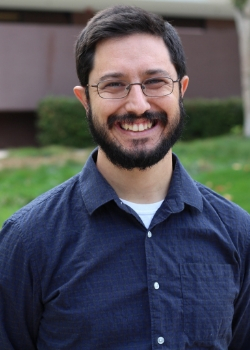My wife, Heather, and I are the happy parents of a 16-month-old baby, Winnie. Each day, it seems that baby Winnie introduces a new insight to amaze us. From the big milestones, such as her first steps, to those little, sweet moments of hugs and cuddles, we feel consistently blessed by our child. Her shining personality continuously unfolds as it did just this past week when she uttered her first sentence. Winnie pointed to an object on the ground, looks up at Heather and me, and asked, “What is this?” Heather and I were floored. We were not even sure at first listen that they were intentional words—considering the possibility her babbling noises merely sounded like real words—until she repeated her sentence two more times. There it was. Our baby’s first sentence was a question. One that looked to understand her world. This question, while of a seemingly simple nature, attempted to probe the surroundings with an investigatory eye. It was a question that suggested a deep desire to learn and a profound thirst for knowledge.
It just so happens, as we learn in this week’s Torah portion, Winnie is certainly not the first person who deeply desired knowledge. In Bereshit, we read of God’s instructions to the first human that all trees of the garden of Eden are permissible to eat, “but as for the tree of knowledge (da’at) of good and bad, you must not eat of it for the day you eat of it, you shall surely die” (Genesis 2:4). Of course, this is where it all takes a turn, and we have the first instance of paradise lost. The humans eat the fruit thus gaining this mysteriously profound knowledge, this da’at, and they do so at the ultimate cost. They trade possible immortality for knowledge. Da’at is no ordinary, cursory piece of trivia. Rather this is a deeper knowing, a sort of spiritual sensitivity and astute recognition of the universe around us.
To explore further, we turn to the commentary of the Kotzger Rebbe, the early-middle 19th century Hasidic Rabbi Menachem Mendel of Kotzk, Poland. He explains the depth of this decision by the first human to eat from the tree, to seek this da’at: “Adam said to himself, ‘It would be better that deaths were imposed upon me and my offspring throughout all generations, but I will not be without knowledge (da’at) for even a brief moment of time.” Adam becomes the prototype for the long cited Socratic axiom, “The unexamined life is not worth living.” The first human was afforded the choice and opted for a life of finitude and knowledge over one of eternity and utter naivete. Ever since, humans have had this deep desire to learn, to grow, to search for this knowledge, this da'at, despite any and all instincts to ignore the pain that we might encounter when we let go of our blissful ignorance.
Here we find ourselves, back at the beginning of the Torah. We have turned it over once again and can reexamine it. We can again ask of our shared holy text, “What is this?” as we dissect its stories and probe its teaching. We just experienced a month of potentially transformative holidays from Rosh Hashanah to Yom Kippur, from Sukkot to Shemini Atzeret and Simchat Torah. At this time of year, we are afforded the blessing to review our own lives with fresh eyes, to ask, “What is this?” as we do an accounting of our own souls and examine if we are living the lives we are meant to live. We are invited to take a deeper look at our surroundings at our community, our society, and beyond, and ask, “What is this?” What greater truth, what deeper knowledge, what da’at, must we seek to find?
We no longer have the option to avoid the challenging questions. The fruit has been eaten, and we are blessed with open eyes to explore. It is up to us to determine what questions we must ask and what knowledge we must uncover. It is my blessing for us all to learn it from the commentary of the Kutzger Rebbe, to learn it from the philosophy of Socrates, to learn it from the question of a baby, and to feel emboldened to ask, truly and honestly and with neither shame nor hesitation, “What is this?”


 Download PDF
Download PDF